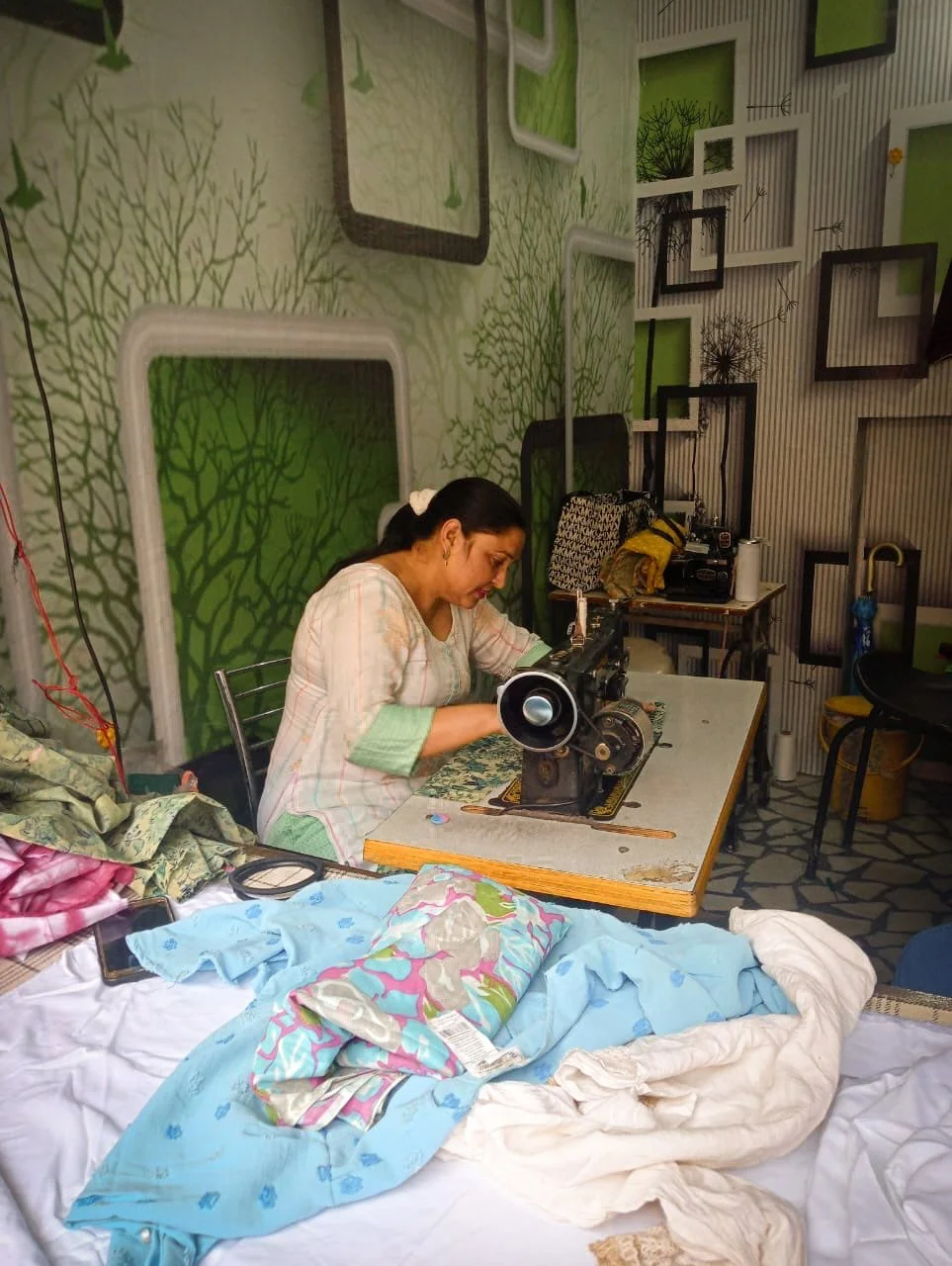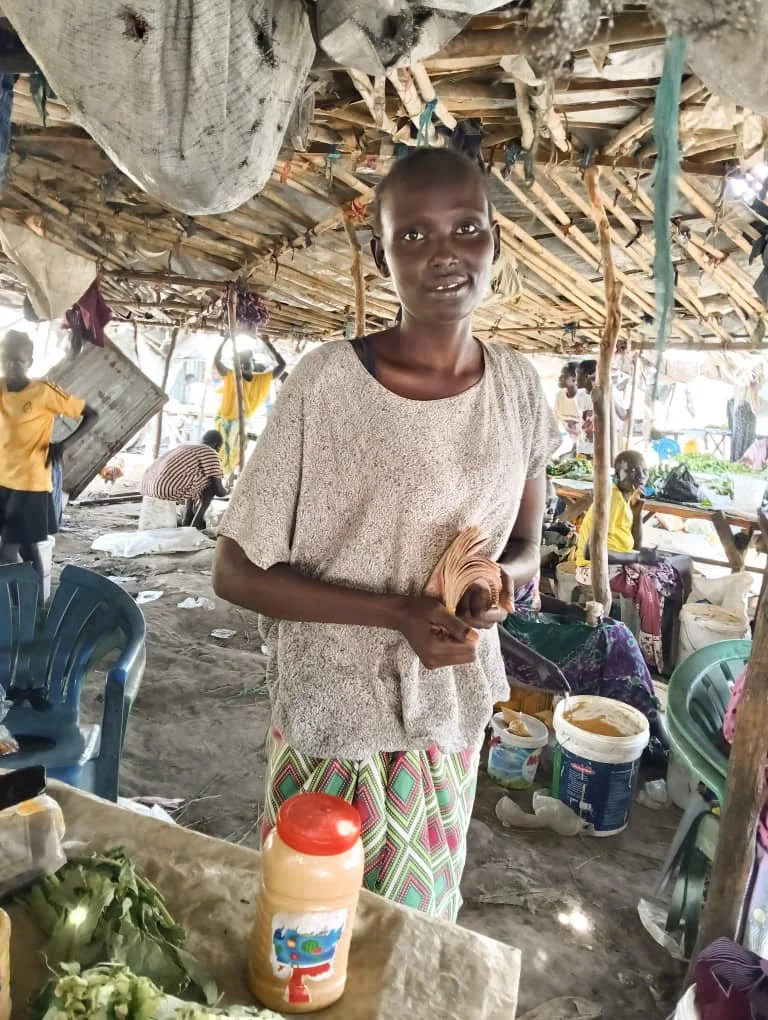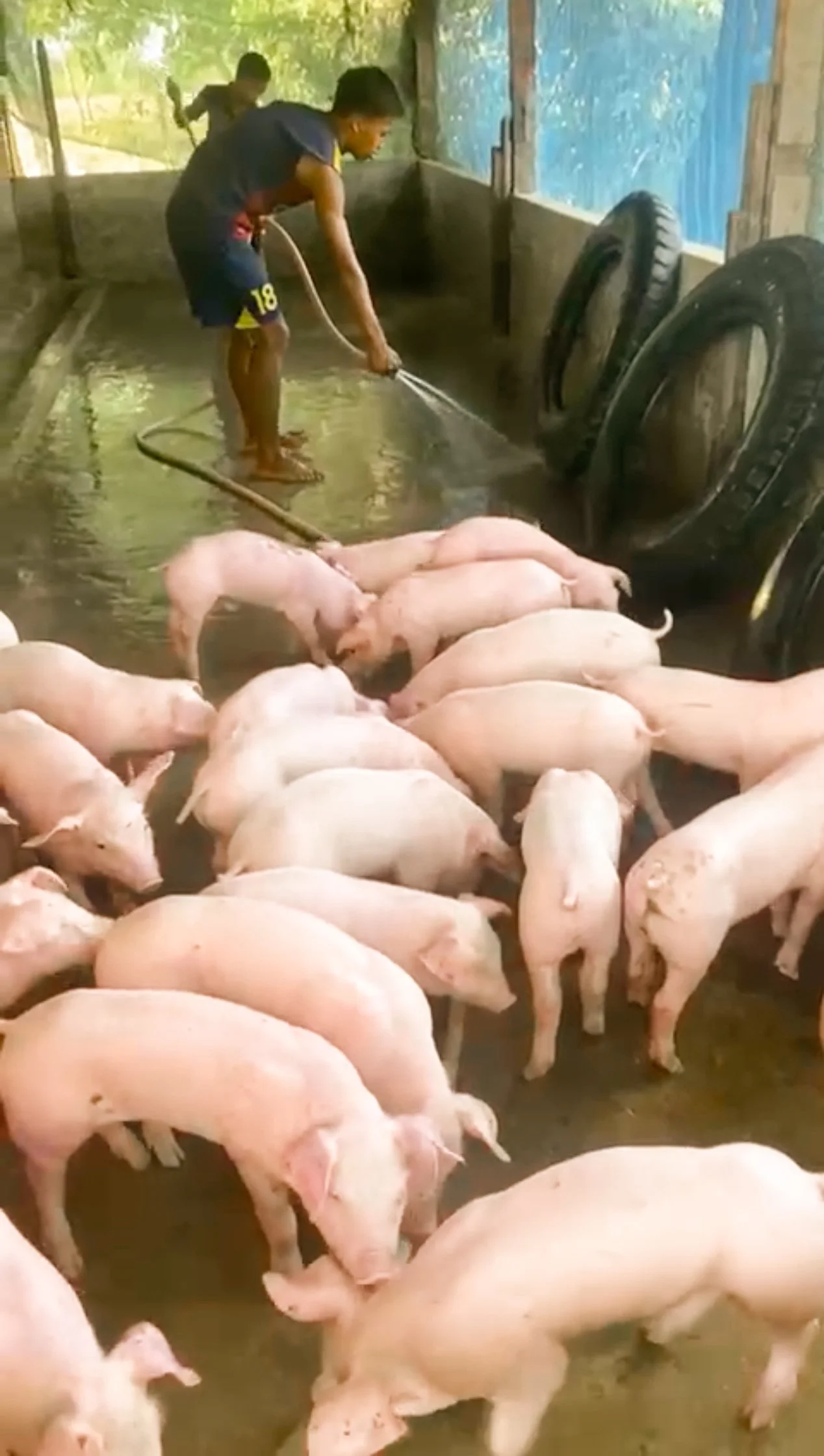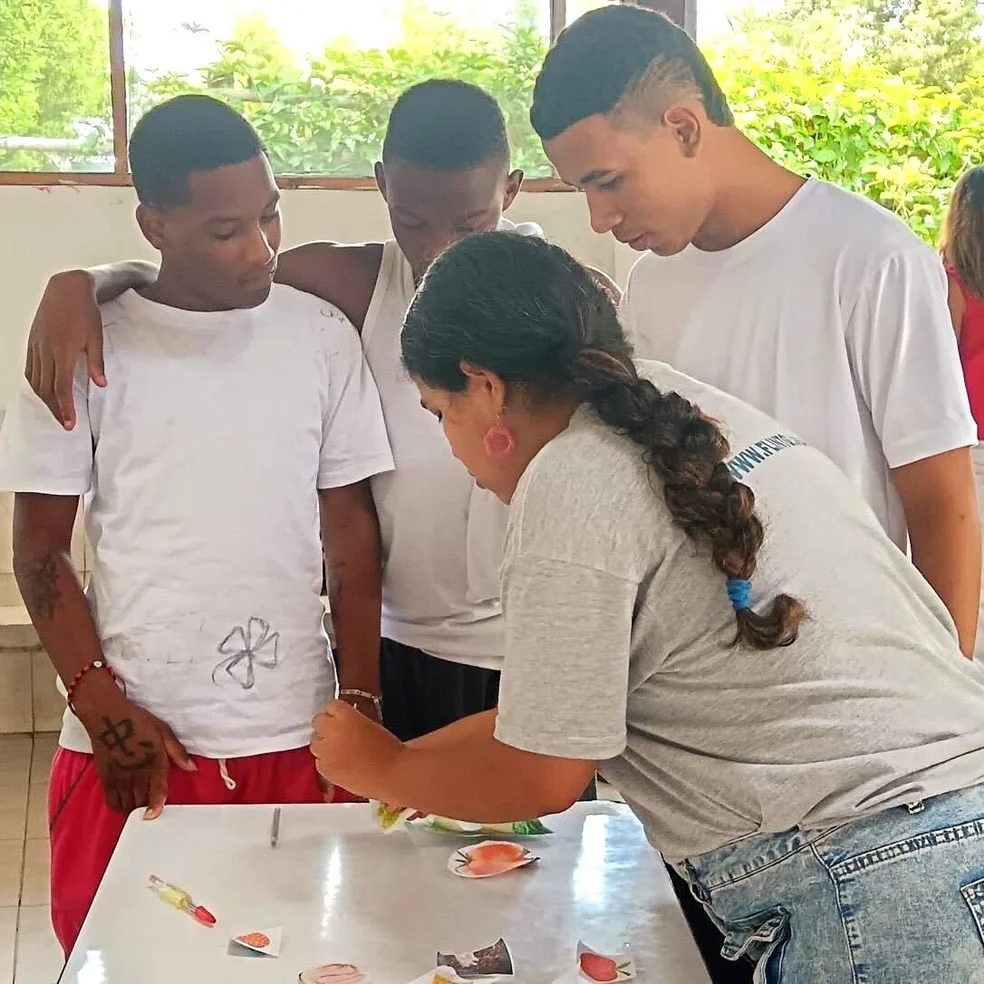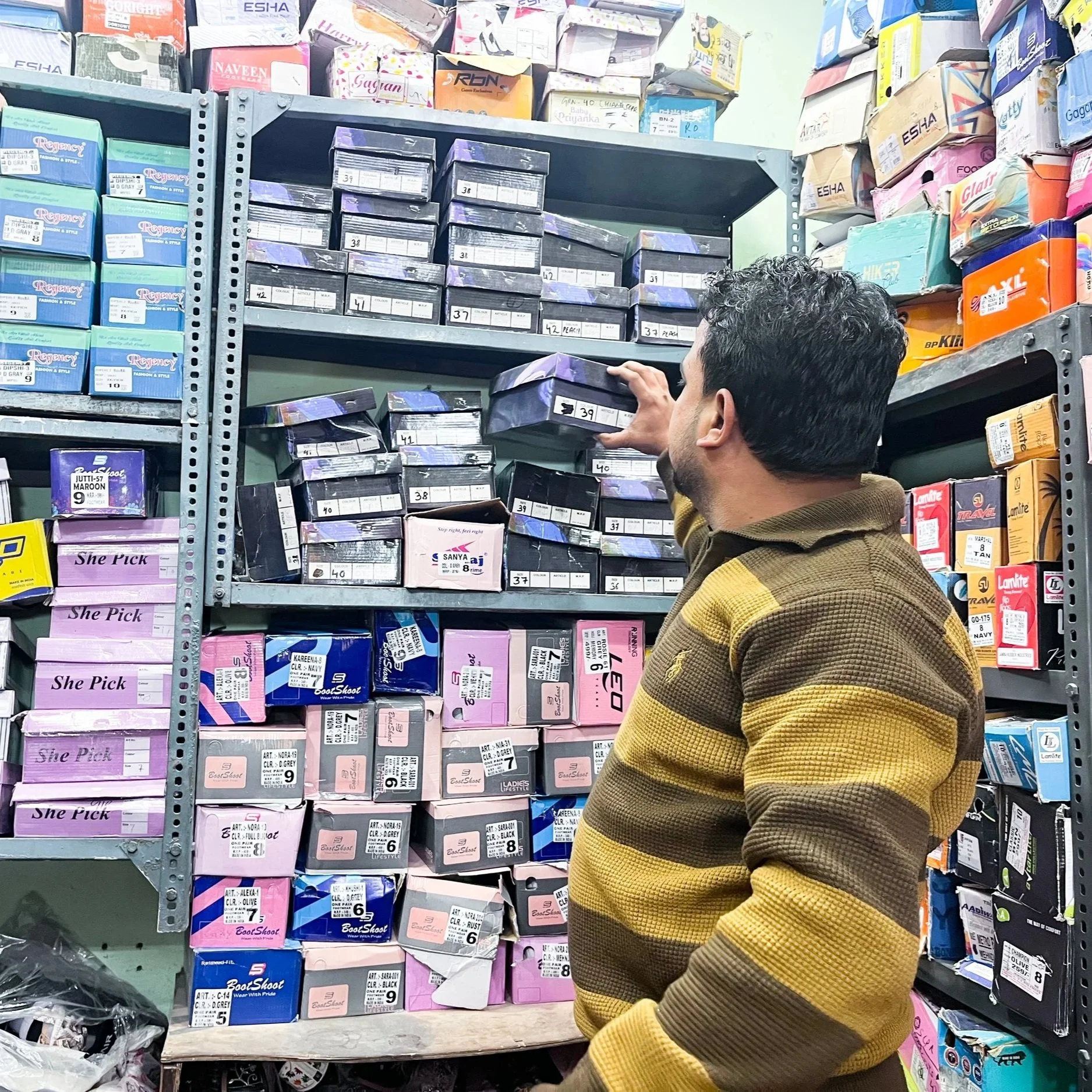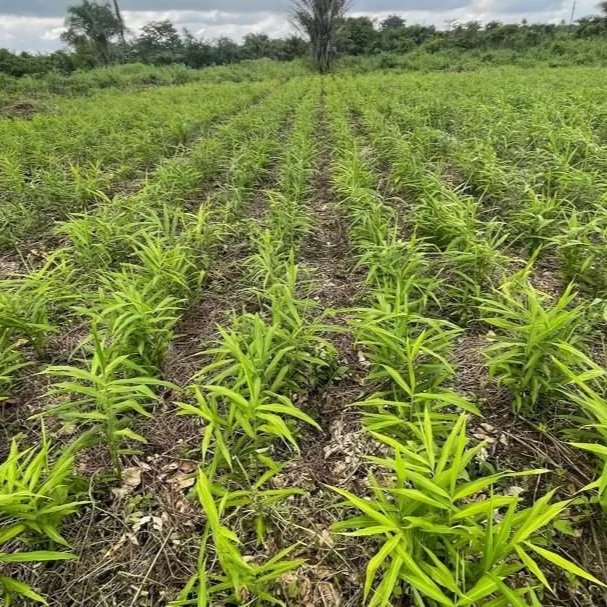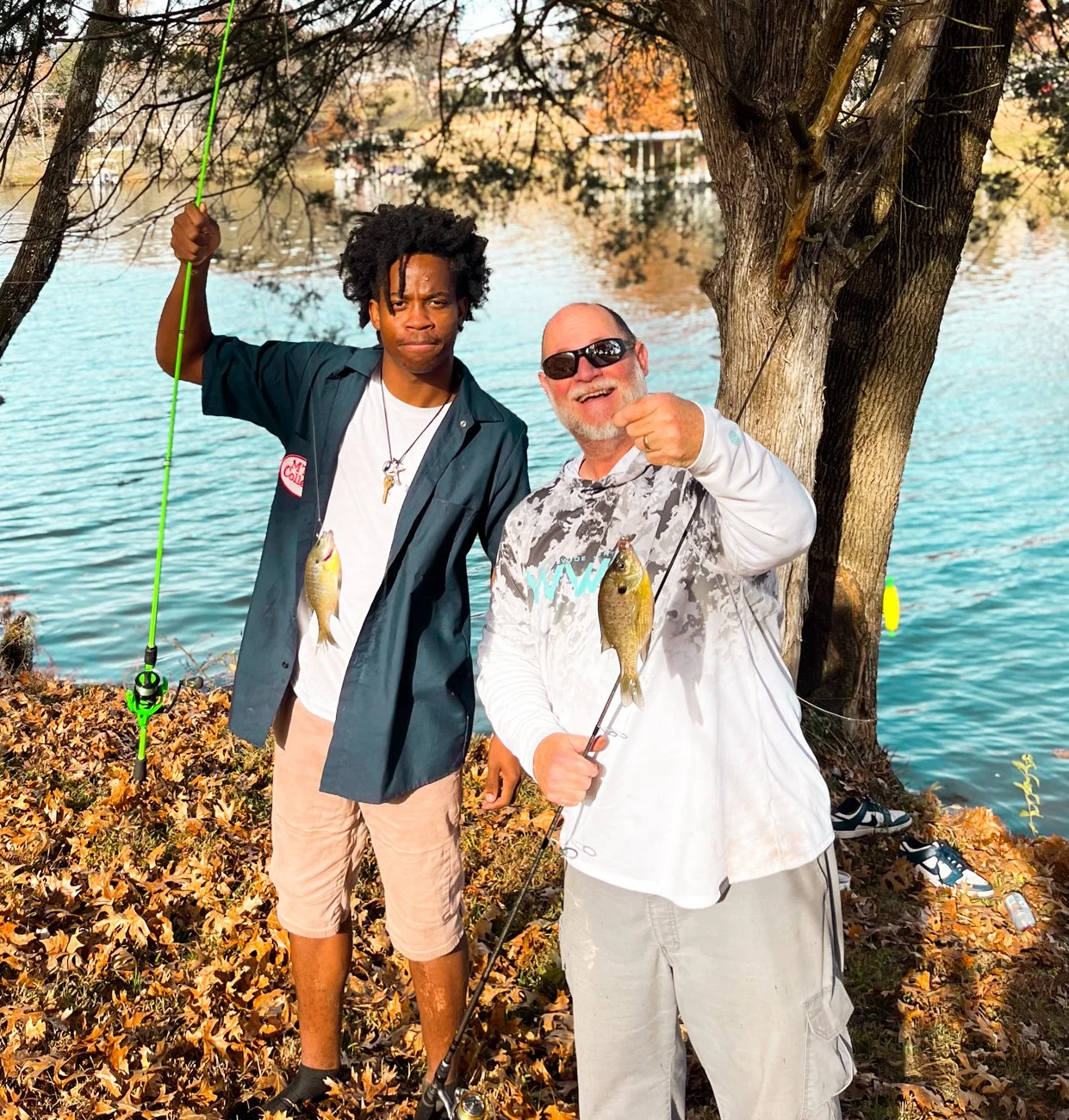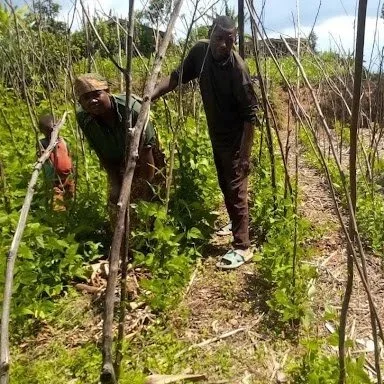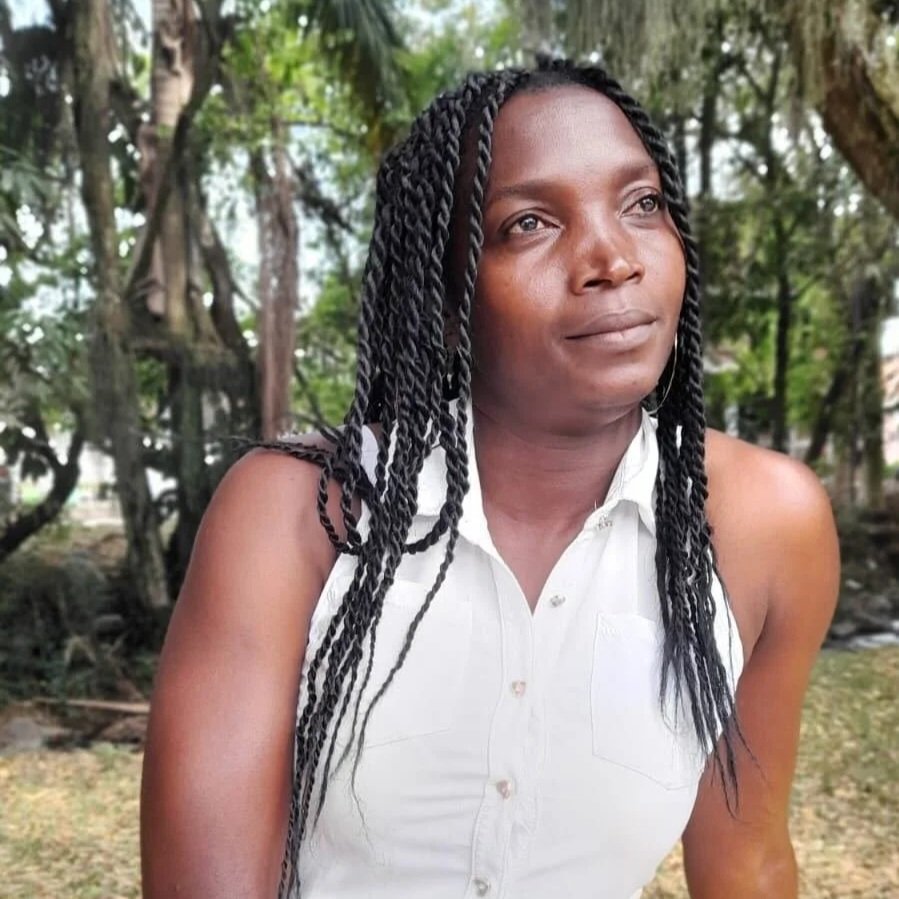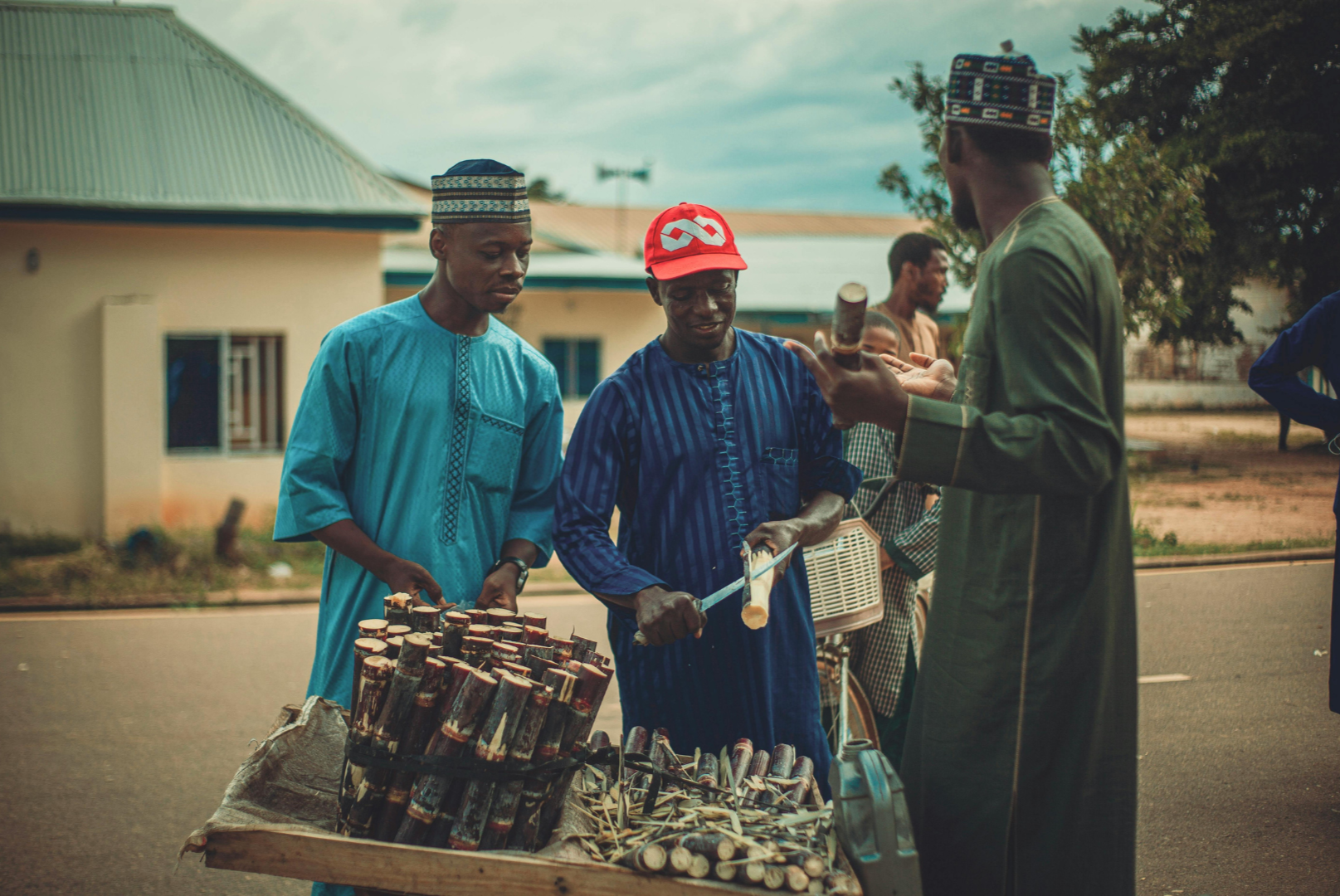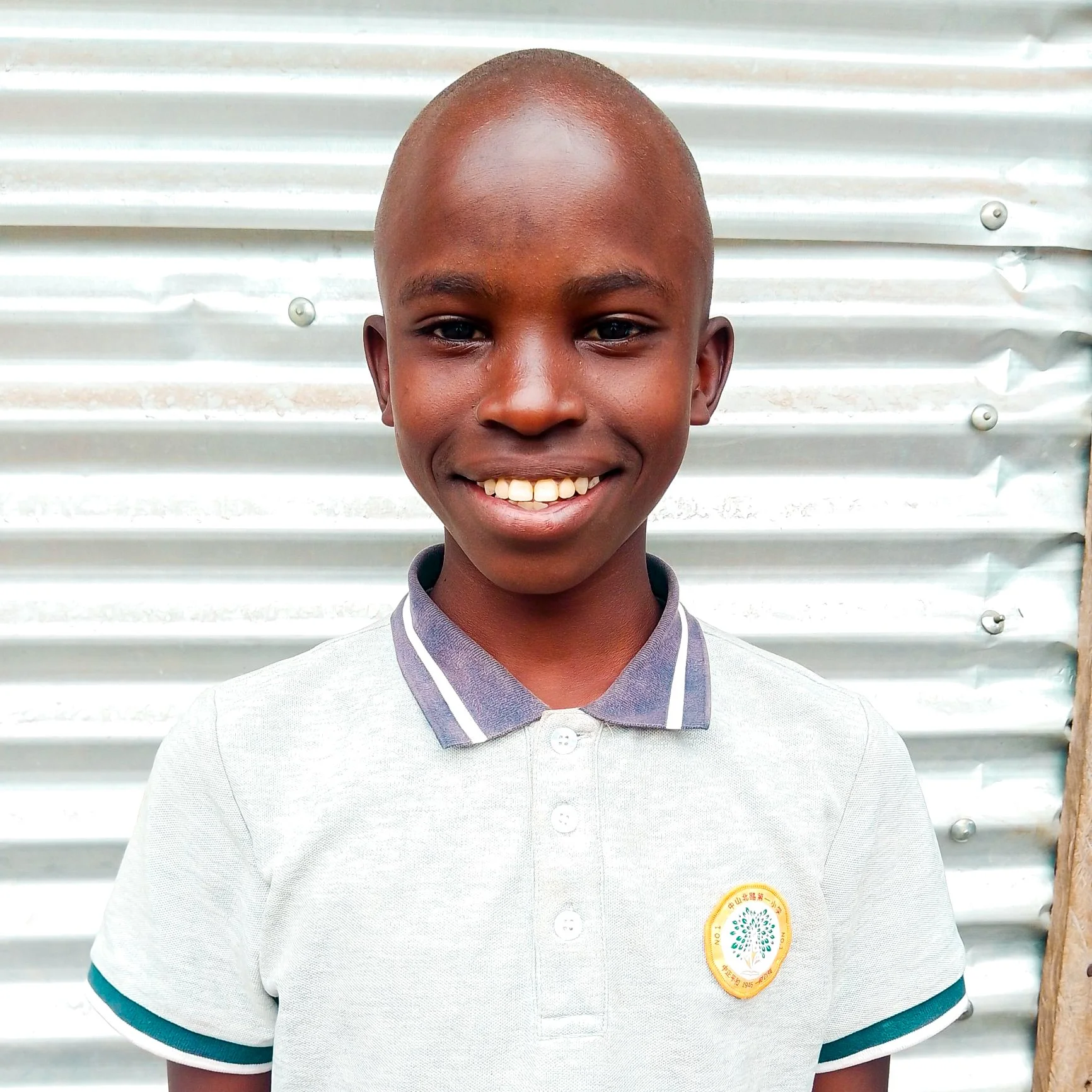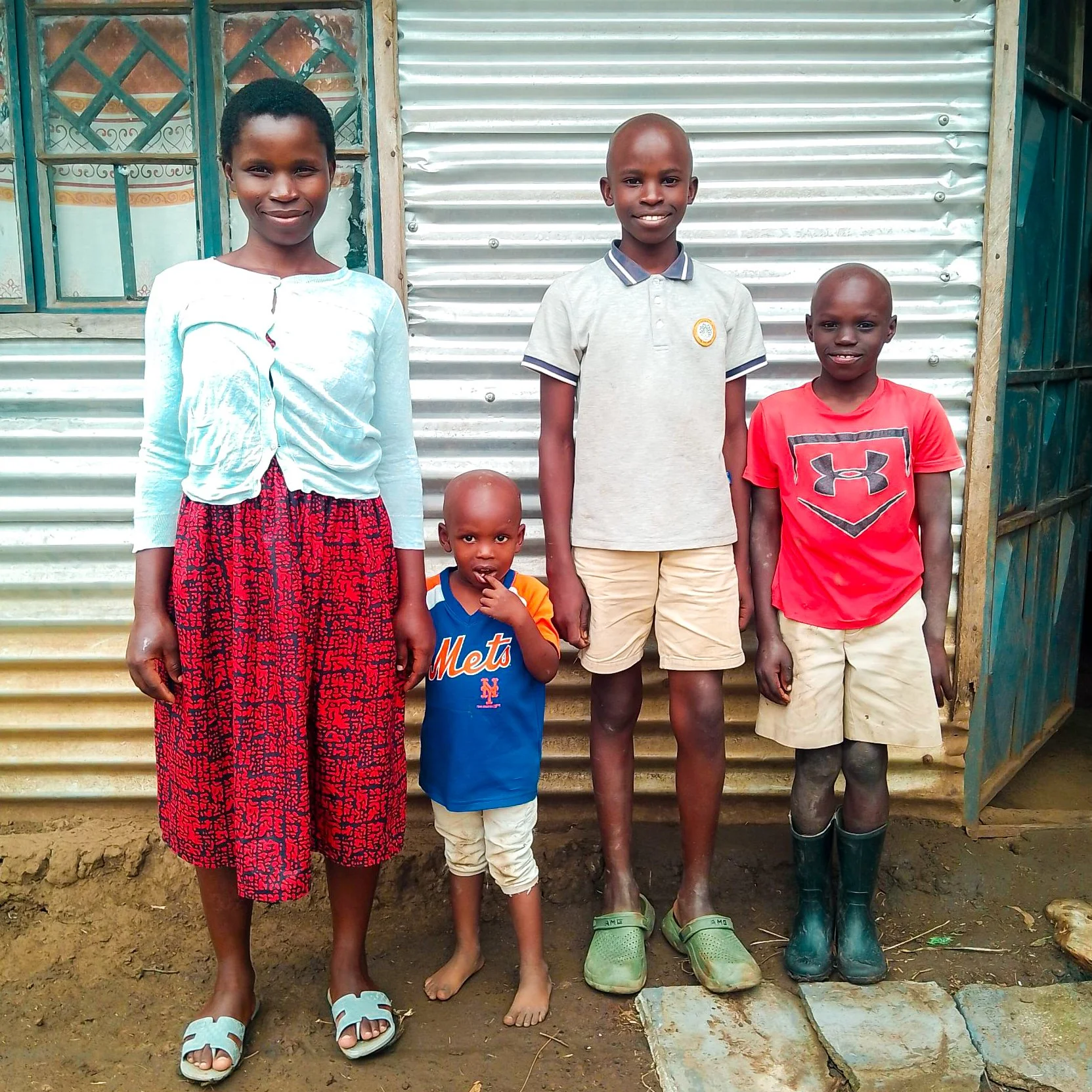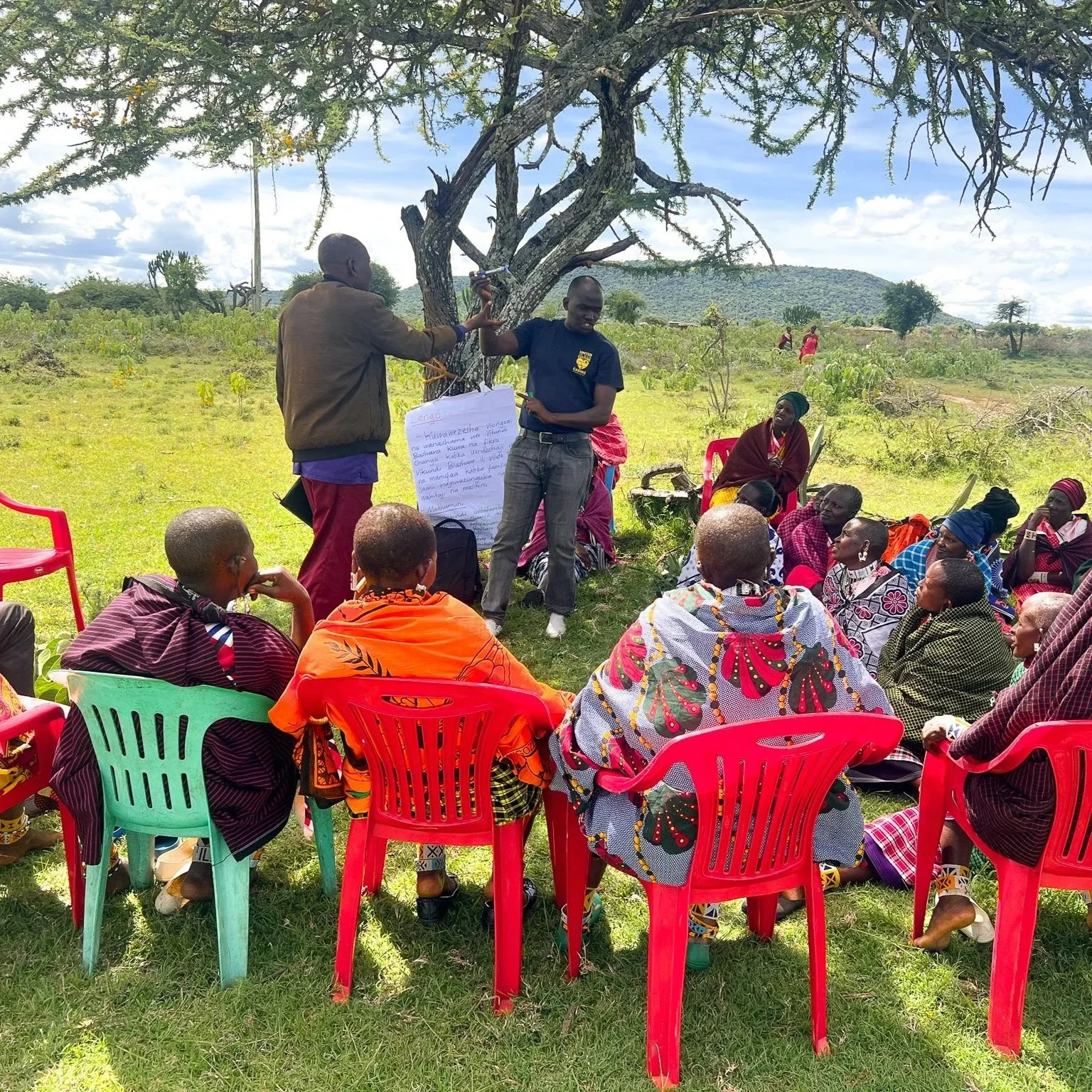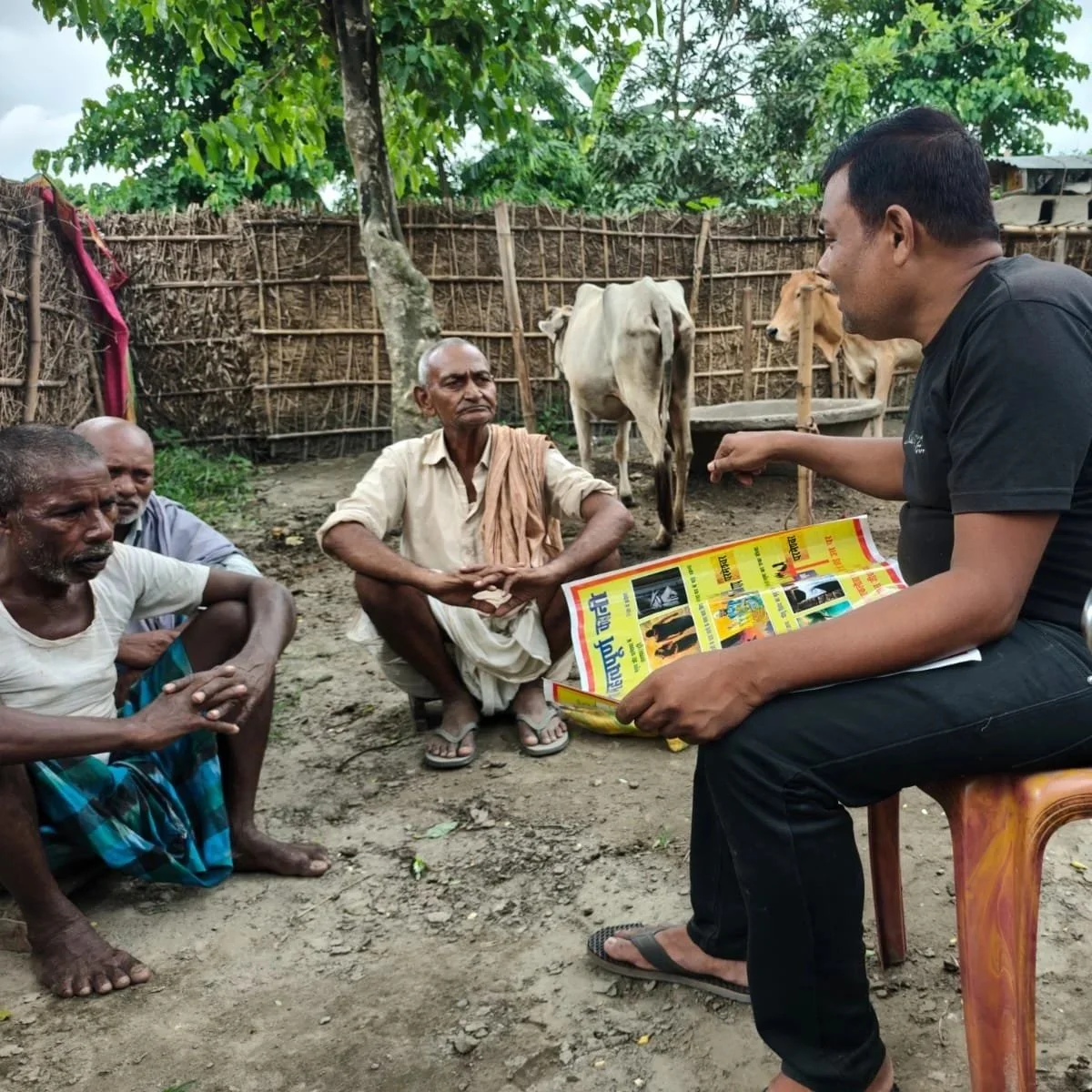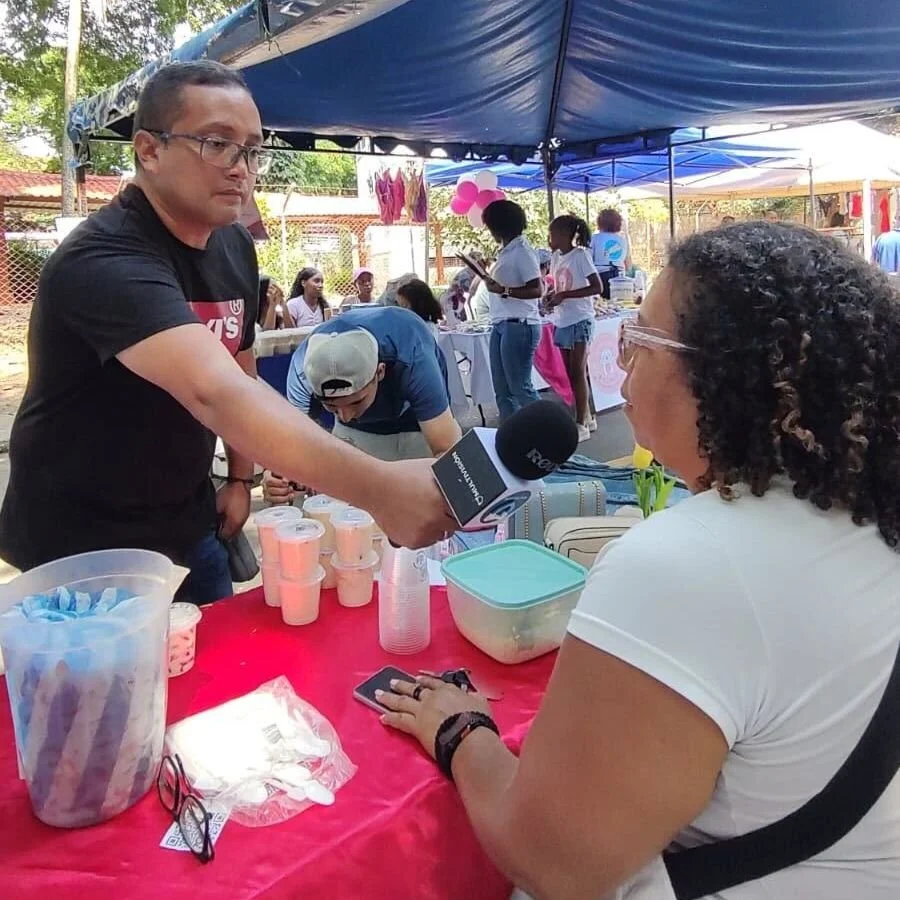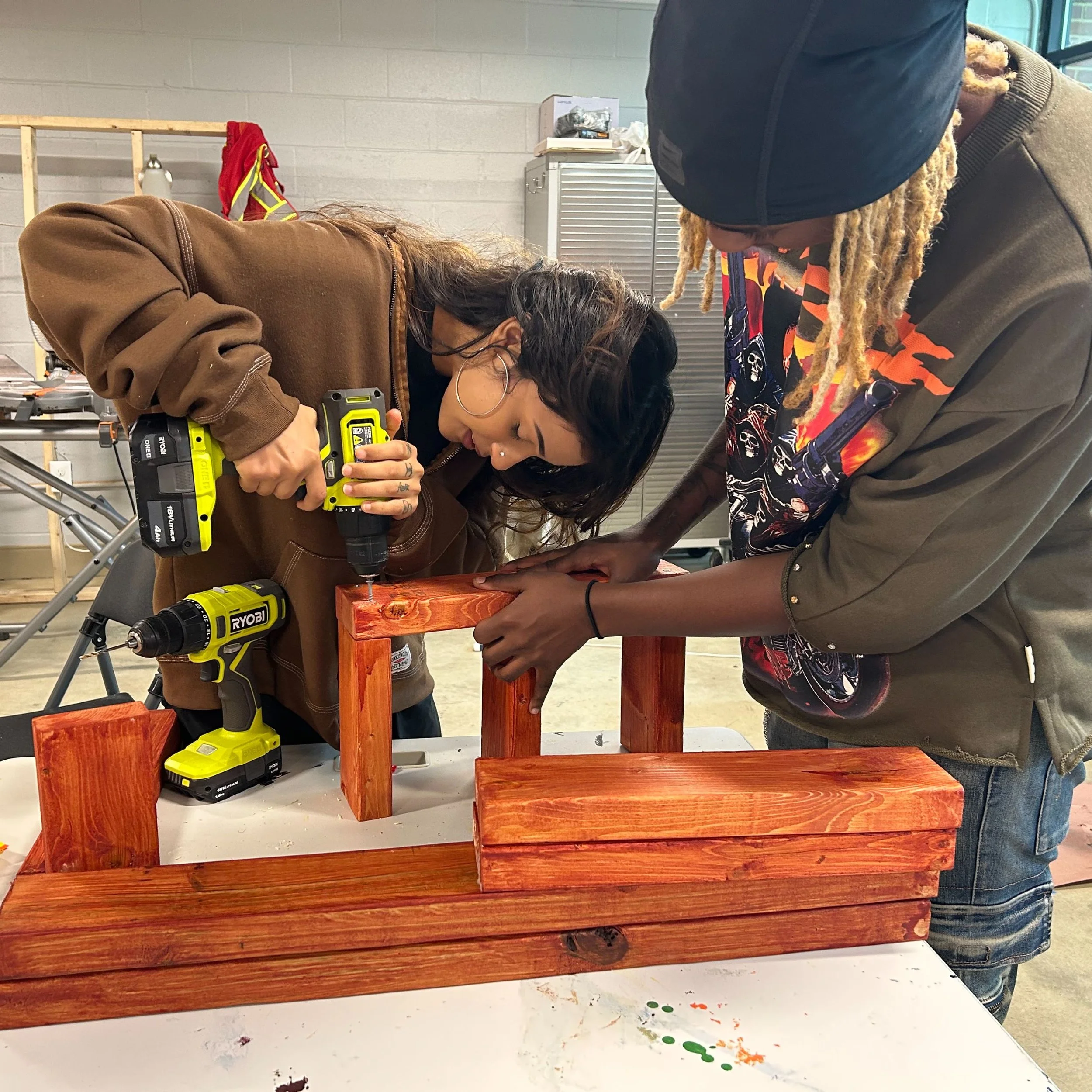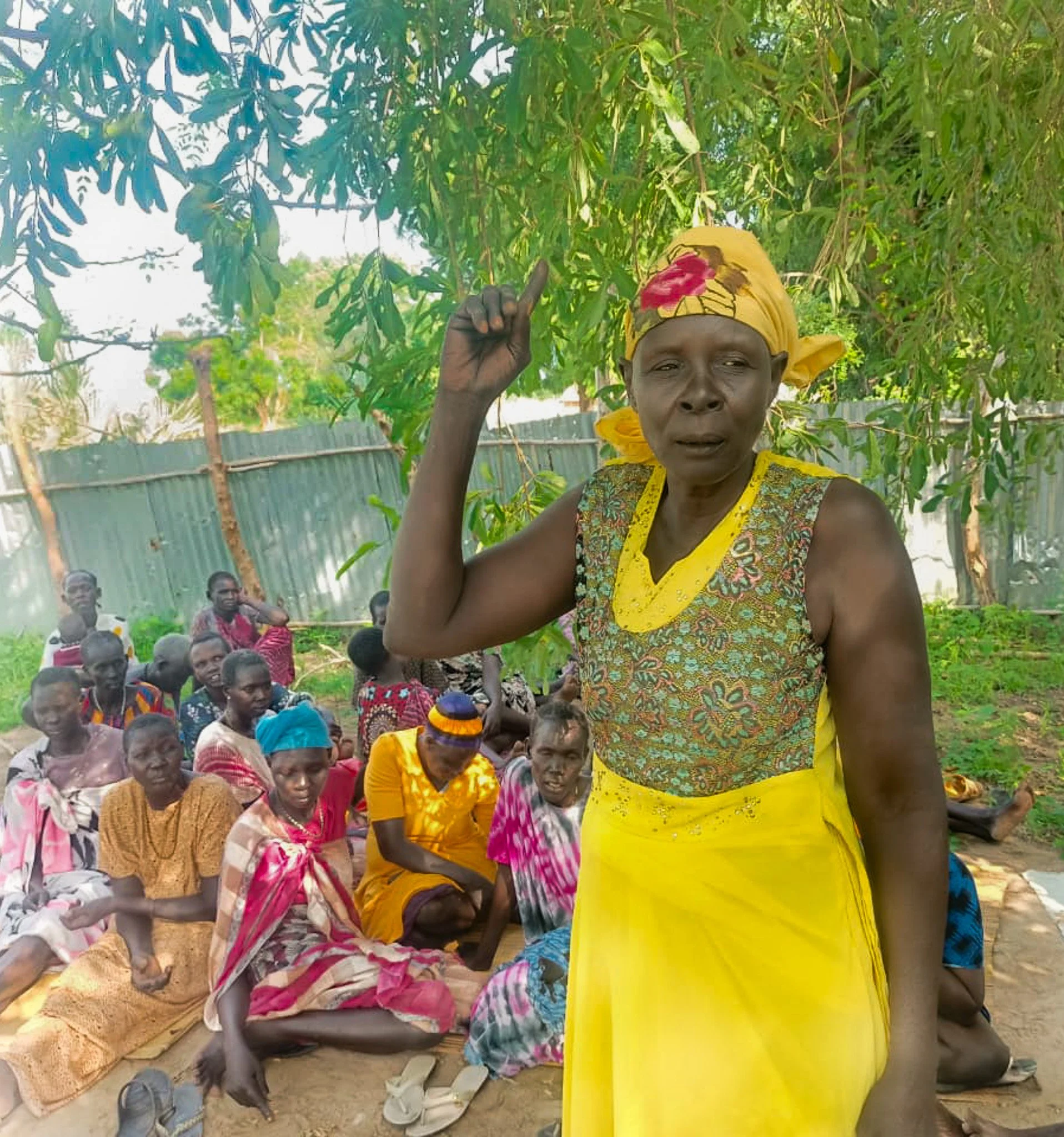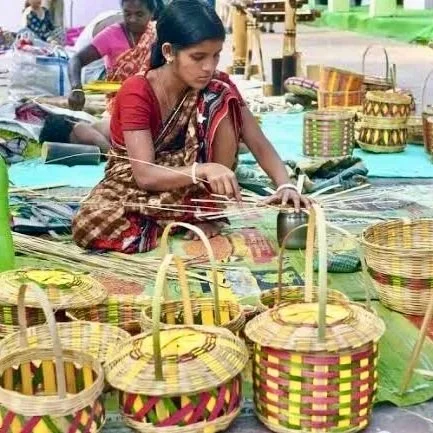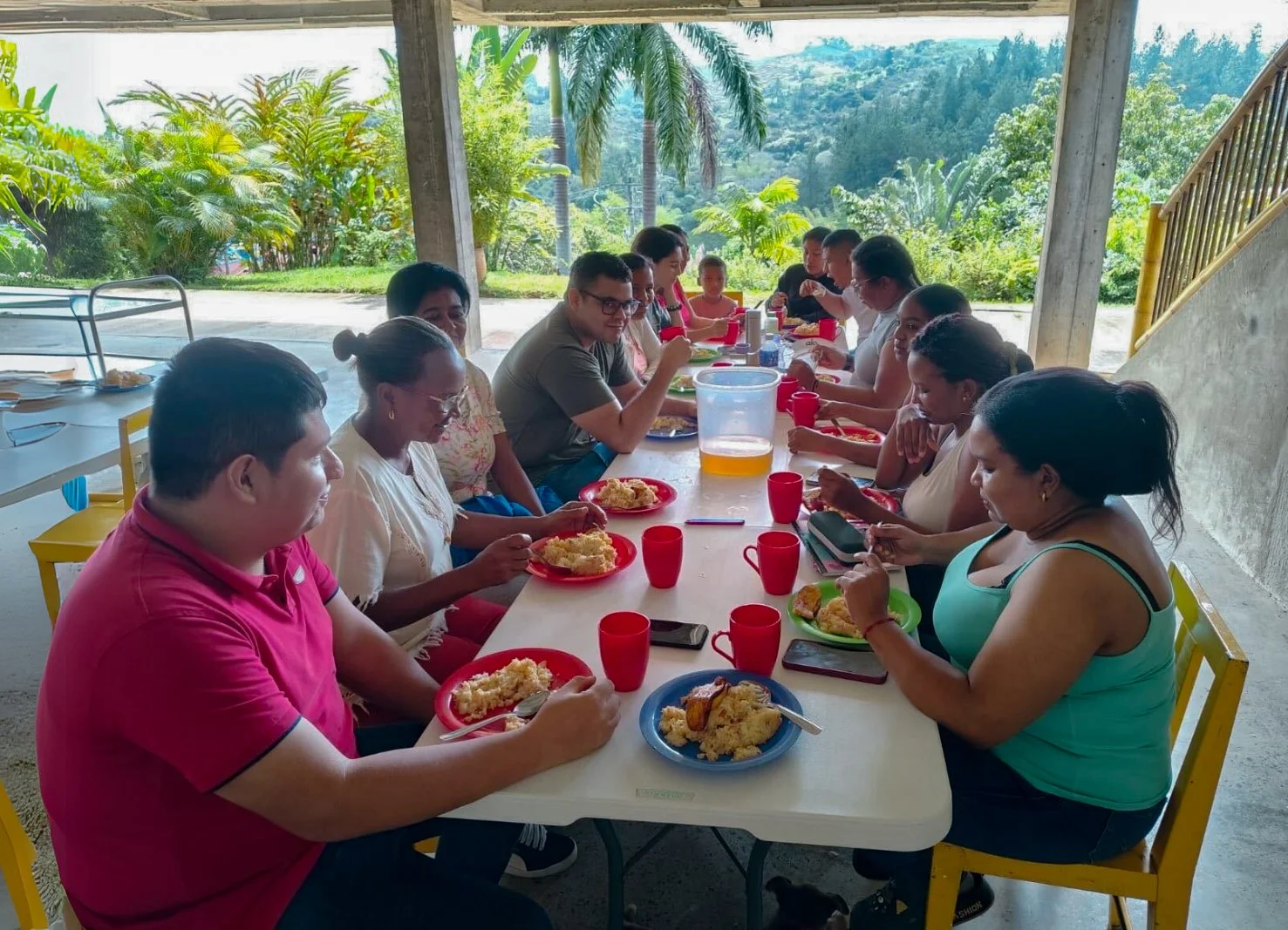Stories
Work from Home (for Change)
India • 1/23/26
For years, Priti’s sewing machine sat in her home, a silent reminder of a skill she possessed but couldn’t monetize. Like millions of women in India, she spent her days consumed by unpaid domestic work, labor essential to her family’s survival, yet invisible in an economy where income brings security, voice, and respect. Without money of her own, she was trapped in a cycle where dependence bred vulnerability and eroded confidence. But today, the rhythmic hum of that same machine fills the room. It is the sound of dignity. No longer limited by the demands of her household or neglecting them, Priti is now an entrepreneur earning an average of $12 a day, enough in her community to cover food, contribute to school costs, and ease constant financial strain. With every stitch, she is rewriting her status in her home.
Priti’s earlier struggle reflects a broader reality. Recent government data reveals that women in her region still shoulder the vast majority of unpaid caregiving, spending nearly five hours a day more on these tasks than men. Priti had the technical talent for tailoring, but she lacked the business management training to turn that skill into a livelihood. This is where the partnership with Flint Global stepped in. Through specialized training and follow-up coaching, Priti didn't just learn how to sew, but also how to manage a business. The coaching bridged the gap between capability and courage, allowing her to view her domestic sewing machine not as a household appliance, but as a capital asset.
The transformation is tangible. That daily income changes the trajectory of her son’s life and secures her family’s financial future. Most importantly, Priti has regained the respect of her husband and found her voice within the household. Yet, the statistics remind us that for every Priti, there are countless women still trapped in the cycle of unpaid labor and financial dependence. Your support provides the essential business coaching that unlocks this potential. By investing in Flint Global, you aren't just funding a program that helps people get by financially. You are helping women like Priti move from invisible labor to recognized, empowered entrepreneurship.
The Road from Nowhere
South Sudan • 1/16/26
The scent of roasted peanuts fills the air around Grace’s stall in the bustling Marol Market in Bor, South Sudan. Just months ago, this vibrant scene felt impossible. Grace admits, "I nearly ended my own life before joining the AWACE [Awake for Women and Children’s Empowerment] group because I had been sick for many years and had no counseling." She felt like her hope was "nowhere."
Today, she stands as a thriving businesswoman. Through Flint’s program in Grace’s village, she learned the power of bulk buying. She now travels between Jonglei State and Central Equatoria to source her most popular commodity: peanut butter. She says simply, "I have resurrected from depression."
The road from Jonglei to Central Equatoria is long, but Grace travels it with a new sense of agency. She is constantly looking for goods to buy for resale near her home. The business skills training opened her eyes to a simple but life-changing equation: buying in large quantities yields profits she never imagined. The Marol Market group launched in the past year and has become one of the fastest-growing collectives for AWACE, and Grace is living proof of why that growth matters.
"I really lack words," Grace says, extending her appreciation for the opportunity. The transformation goes deeper than the profit margins on a jar of peanut butter. It is about a restoration of dignity. After years of sickness without support, the community and training provided a lifeline. She says, "I thank God for the gift of AWACE and Flint Global because I have gained so much life from this group."
Grace’s story represents the resilience waiting to be unlocked in Bor. When you invest in Flint Global, you aren't just funding training and coaching. You are fueling the resurrection of hope for entrepreneurs like Grace.
Restoring Lives & Livestock
Myanmar • 1/9/26
Joseph stands before the pig pen, the squeals and grunts of a new herd filling the air. This sound used to mean survival, but now sings of resilience. In a region of Myanmar scarred by civil war, Joseph and his wife have turned their home into a sanctuary for orphans. But after a medical crisis forced him to sell his livestock and drained every cent, the silence in the farmyard was deafening. Today, that silence is broken. Equipped with a $5,600 startup grant from Agape Asia, secured through a business plan vetted and refined by Flint Global, Joseph is launching a venture projected to generate $4,000 in annual profit. He isn’t just rebuilding his pig business, but rebuilding a home for children in need.
Just months ago, the weight of medical debt and the needs of a growing household felt insurmountable. Agape Asia was already a vital lifeline, providing monthly funds to cover about half the costs for food and school fees. However, both Joseph and Agape understood that true security required more than partial aid. It requires a reliable stream of income that can weather the storms. Through their sustainability program, Agape Asia contracted Flint Global to provide the high-level training and coaching necessary to launch a successful venture.
Traveling to Singapore for a three-day intensive workshop with Flint’s team, Joseph didn't just learn about budgeting… he unlocked a new perspective on resilience. He combined his agricultural experience with Flint’s tools for strategic planning, transforming his ideas into a concrete, vetted business proposal that Agape Asia was proud to fund.
The result is visible in a video Joseph recently sent us (screenshot from the video included here). The new herd is thriving, but the true return on investment is in the capacity of his heart. Joseph reports that the profits will bridge the gap in his household budget, securing the education of the children currently in his care and allowing him to welcome three more orphaned children into his home. This is what an effective partnership looks like: Agape Asia providing the resources, Flint Global equipping the entrepreneur, and Joseph building a family on a foundation designed to last.
When Presence was a Present
Colombia • 12/26/25
“I am the boogeyman of Villa Paz," Junior told his counselor.
He said it like a warning. It was a role he had already been cast in. In the Thriving Skills classroom in Jamundí, he leaned into it at first. He arrived late. He interrupted. He watched closely to see who would stop him.
That’s why it mattered that, on this morning, when the counselor pushed open the classroom door, Junior was already there.
He sat at one of the scratched tables near the center of the room, hands flat against the worn surface. The plastic chair creaked under his weight. Sunlight cut through the window slats and traced the grooves left by years of students before him. Junior looked up, stood, and smiled.
“Teacher,” he said, holding up a pen, “I brought my pen.”
In a place where distance had once been his armor, being enthusiastically present was a choice that signaled the promise of real change.
Junior is fifteen. He arrived at the Villa Paz Foundation from Buenaventura, a port city shaped by violence and loss. When he entered Flint Global’s Thriving Skills program, he carried that history into the room with him. Lateness gave him control. Interruptions kept attention where he wanted it.
Instead of pushing him out, the counselor named something else. In this classroom, she told him, everyone had value. There was time to joke, and time to focus. When Junior participated with intention, she said, it mattered.
The shift came in pieces.
One week, he arrived late but stayed quiet. When asked about money management, he answered, “It’s important to manage money well because, otherwise, you have to lend and they charge you with interest.” Afterward, when the counselor thanked him, Junior ducked his head and smiled.
The next week, he arrived on time.
Then, one morning, early.
Now, before the counselor even reached the front of the room, Junior was already seated. Around him, students leaned over shared projects, paper sliding softly across the scarred tables, hands pointing, adjusting, building something together. Junior listened. When he spoke, it moved the work forward.
In Cali and its surrounding communities, where young people are often pressured to repeat cycles of abandonment and violence, change doesn’t always announce itself loudly. Sometimes it sounds like a chair scraping into place. Sometimes it looks like a pen held ready.
By the time Junior graduated from the Thriving Skills program, this way of arriving had become familiar. He's not the boogeyman running away anymore. He's a leader who's showing up for his classmates, his counselors, and himself.
Sign up for Flint’s Friday Four to never miss a story! • Give a gift to make more change like this possible!
If The Shoe Fits
India • 12/19/25
Hardeep used to sit in his rented footwear shop in India, surrounded by silence and unsold inventory. He had the technical skills from his previous employment, but he lacked the strategic mindset required for ownership. Every unsold pair of sandals represented a meal Hardeep could not provide for his family. The anxiety was a physical weight on his chest, pressing down on him as the rent due date approached.
He needed more than just hard work. He needed a strategy. Through Flint’s practical business training, locally called “Business for Movements,” Hardeep encountered a simple but explosive concept: know your customer to serve your customer. And that changed his entire approach…
He realized he was trying to sell luxury to neighbors who needed utility. The shelves were refilled with articles based strictly on the price range suitable for the purchasing power of the people walking past his door.
The adjustment worked. Today, the silence is gone. The clamor of anxiety has been replaced by the hum of busy commerce. His venture is profitable, and Hardeep is already looking to expand his store into a larger facility. This is the power of insightful advice combined with opportunity. When a dynamite curriculum gets into the hands of hungry entrepreneurs, the results can give them a new footing that transforms their failing ventures into a vibrant livelihood.
Sign up for Flint’s Friday Four to never miss a story! • Give a gift to make more change like this possible!
Mastering the Foundations
Sierra Leone • 12/12/25
Instead of lying bare under the equatorial heat, the fields of Moyamba District rest beneath a thick, protective blanket of mulch. It is a sign of how both the earth and the people who farm it are becoming more resilient. In Flint’s program with Muwasa Farmers Association, the rhythm of farming begins with covering the soil, protecting its moisture, and letting life take root.
Now, green ginger shoots have pushed through the mulch, vibrant and sure. Each one is a small declaration of what patient stewardship can yield. Success here is not about complex machinery. It is about mastering the foundations. If one desires excellent outcomes, the work must begin in the lowest places.
Flint Global Partners works with Muwasa to reinforce these essential principles of sustainable agriculture. By prioritizing a strong mulch cover, these farmers are not just planting crops; they are engineering a defense against a harsh climate. Their developing ginger crop is the beautiful result of getting the basics right.
And excellence doesn’t stay contained. In a region where poverty runs deep and food security is rarely guaranteed, Muwasa’s fields have become a living classroom. The neighbors are watching. They see how the soil under the mulch stays moist, how the crops hold strong. Yet the need for this knowledge remains vast. Farming in Sierra Leone is still a daily struggle for too many.
Just as this groundwork begins to spread, Muwasa is stepping into a new chapter. This stage of growth will not just provide food for a few, but seed a whole new local economy.
Sign up for Flint’s Friday Four to never miss a story! • Give a gift to make more change like this possible!
Hook, Line, and Sinker
USA-Nashville • 12/05/25
It’s often said that giving someone a fish can help them for a day, but teaching someone to fish can change their life. If that’s true, then Kris is learning to cast his first lines into a brand-new future.
When Kris arrived at the Judge Dinkins Educational Center (JDEC) in January, he carried more than schoolwork on his shoulders. A serious car accident had kept him out of school for nearly a year, and when he returned, his GPA had plummeted to 0.08. Coupled with other challenges, Kris was referred to JDEC through Nashville juvenile probation.
From day one, Kris brought curiosity, enthusiasm, and a willingness to try. Within months in our Thriving Skills program, he opened his first bank account, built a budget, created a résumé, and applied for -- and landed! -- his first job. Today, less than a year later, Kris holds a 4.0 GPA and a clear sense of direction. He has a long road ahead, but he’s committed to his goals hook, line, and sinker.
Kris’s growth extends far beyond academics. Alongside his construction-trades training, he’s gaining the life skills that help young people stand on their own: getting his driver’s license, cooking basic meals, buying a car, and finding safe housing. He’s even learning to fish — literally and figuratively.
He’s exploring new opportunities he never imagined existed: real estate education, different therapy styles, building a workout routine, and communicating confidently with his boss at Dunkin’ Donuts. And now, with his GPA soaring, he’s preparing to apply to Vol State or Tennessee State University.
Kris wasn’t thriving in the traditional school system. There simply weren’t many fish in that pond. But JDEC and Flint’s Thriving Skills program brought him to a new lake, one full of possibilities and surrounded by people who believe in him.
The road ahead is long, but Kris can finally see his path. He sees graduates like Kobe, Jacob, Jaylun, Jose, and Jason building stable, thriving lives ahead of him, and he’s determined to join them.
Sign up for Flint’s Friday Four to never miss a story! • Give a gift to make more change like this possible!
Walking the Rows Toward Change
Rwanda • 11/21/25
One month after the training, Clarisse walked through his bean field and immediately noticed the difference. The rows were more even, the plants stood sturdier, and the soil held moisture long after the sun burned off the morning dew. “Before attending the conservation agriculture training, I used to think farming was only about working hard and waiting for rain,” he said. “Now I can already see changes.”
For years, Clarisse planted maize and beans and simply hoped his crops would survive the season. Some years they did. Many years they didn’t. What kept him going was watching neighbors adopt conservation agriculture and transform fields that once looked just like his. Across the community, farmers who tried the new methods were beginning to see results once out of reach — early signs that small shifts in the soil can spark big shifts in a family’s future.
Their soil held moisture longer. Their harvests grew steadier. Their families lived with less stress. Seeing that progress finally pushed him to join Flint’s training in October 2025.
“During the sessions, I learned that as a farmer it is vital that I plan well and care for the soil,” he said. “This changed my mindset completely.” Farmers began applying mulch, disturbing the soil less, spacing plants consistently, and planning with more intention. Those simple shifts led some to multiply their harvests tenfold.
Clarisse isn’t at harvest yet, but he already sees the early signs that caught his eye on his neighbors’ farms: more even rows, healthier soil, and growth that looks far more promising than past seasons. He knows these small improvements matter.
“I now understand that with planning and effective farming techniques, success is possible,” he said. He’s already imagining what a better harvest could mean — more food stored at home, less worry in the dry months, maybe even enough to sell.
“I feel more confident and encouraged,” he added. “I believe that my next harvest will be much better and that my family will live with greater stability and joy.”
He took another slow walk down the row. What he saw wasn’t just change on his farm — it was part of a larger shift taking root all around him.
Sign up for Flint’s Friday Four to never miss a story! • Give a gift to make more change like this possible!
Not Afraid to Try
Colombia • 11/13/25
“Fear will always exist in life, but entrepreneurship means taking the plunge, even with fear, because the greatest fear is not trying. However, it’s always better to have tried than to be afraid of failure.” - Rosana
Fear, Rosana knew, wasn't new. It had whispered to her in many moments before this one. But, for the first time in a long while, it didn't sound convincing.
Sitting on a concrete bench in Santander, Colombia, she felt a warm breeze stir the trees, shifting light across the path at her feet. Rosana took a breath—and said yes.
Saying yes to Flint’s entrepreneurship program didn’t make the fear disappear. But it did mean she had finally stopped letting fear speak the loudest.
”I’ve had many meaningful experiences in life,” she would later say. “Meeting my husband, the birth of my daughter, and my time in school. And now, this program. It’s been one of the most important steps of all.”
At first, she thought entrepreneurship was only for people with money or advanced degrees. But slowly, through the program, she began to understand it differently. She met women like her, people with ideas and grit and questions. She listened. She asked. She learned.
“I gained motivation, life skills, and even knowledge about myself,” Rosana says now. “It’s been very fulfilling and satisfying.”
She still walks past the bench sometimes. The foliage behind it shifts with the seasons, just like she has. That moment—sitting still, deciding, taking the first step—became the quiet start of something new. She didn't need everything figured out. She only needed to try.
And the truth is: the greatest fear wasn't failure. It was not trying at all.
Sign up for Flint’s Friday Four to never miss a story! • Give a gift to make more change like this possible!
Sweet Success
Tanzania • 11/07/25
Stephano looked at his bride and felt a quiet rush of gratitude. The laughter, the food, the music—all of it felt impossible only three months ago. He never expected that this story would begin with a dusty old radio.
One afternoon in 2024, he tuned in and stumbled across Flint Global’s business program. The signal was weak, but the message was strong—about starting small, reinvesting, and believing that one’s future wasn’t fixed. He kept listening.
With barely seventy-five cents in his pocket, Stephano bought four stalks of sugarcane from a farmer who, seeing his determination, added a fifth for free. That small act of generosity became his first taste of multiplication. Within hours, he’d tripled his money, within a month, he was building a chicken coop of his own. For the first time in years, Stephano was dreaming of the impossible.
The radio host’s words became a kind of mentorship from afar—steady, patient, and practical. Confidence took root where uncertainty once lived.
Months later, Stephano stood beneath a wedding canopy stitched from borrowed cloth and bright kitenge fabric. The scent of pilau and grilled chicken drifted through the air. Children laughed; elders clapped in rhythm. His love’s hand was warm in his, soft against the calluses he had earned through work. Her smile was a quiet reminder of those words of hope once heard through a radio’s crackle.
“Your program opened my mind and gave me confidence,” he said later. “The knowledge you share is transforming lives in our community. May God bless you.”
For Stephano, the wedding feast wasn’t just a celebration. It was a harvest—proof that even dusty words carried by radio waves can take root, bear fruit, and fill a home with new joy and possibility.
Sign up for Flint’s Friday Four to never miss a story! • Give a gift to make more change like this possible!
Ending School Fee Frights
Kenya • 10/31/25
Lenox has a secret weapon: curiosity. At twelve years old, he wants to know how things work, why they matter, and what he can change. His dream? To become a scientist.
But dreams need fuel, and for Lenox's family, that fuel was running out.
His mother stood in the market day after day, selling liquid soap. Three children to feed. School fees climbing higher. A single income that never quite stretched far enough. Some months, keeping Lenox in school felt impossible.
Then July arrived, and with it, a turning point. Lenox joined Powered by Her Kenya (PBH), a youth mentoring program designed to keep students in classrooms and transform them into community leaders.
The change came quickly. "When we couldn't afford school materials, I organized a study group with friends instead of giving up," Lenox explains. "I'm more confident now." His grades improved. Friendships deepened. And a new goal emerged: advocating for girls like his mom to access the education they deserve.
But we learned something critical: you can't educate a child if you don't empower their family.
That's where our partnership with Sajira Kenya enters the story. While Lenox was learning in the classroom, his mother was learning something equally powerful through a Village Savings and Loan Association.
Her story mirrors countless others in the community. She became a mother while still young herself, partnered with someone equally young and unprepared. Neither finished school. By her third child, she was alone, watching the cycle of poverty tighten around her family just as it had around generations before.
The VSLA changed everything.
Today, Lenox's mom isn't just selling soap. She's building a business. With entrepreneurship training and access to capital, she's developing a plan to scale her operation into something sustainable and profitable. She's learning to create the opportunities she never had, the ones her children desperately need.
Here's what we've discovered: when a boy like Lenox learns, he rewrites his own story. When his mother learns, she rewrites history.
Now their progress feeds each other. Her growing business means steady income and school fees paid on time. For Lenox, it means uninterrupted education and space to dream bigger.
Together, they're proving something profound: education and economic empowerment aren't separate solutions. They're two halves of the same transformation, building cycles of opportunity that lift entire communities, one family at a time.
Sign up for Flint’s Friday Four to never miss a story! • Give a gift to make more change like this possible!
When the Rains Finally Come
Tanzania • 10/24/25
For more than a year, Esilalei’s village leaders had been asking Flint’s trainers to come. Neighboring communities had changed—women starting small businesses, families growing vegetables, meals cooked by biogas—but Esilalei was still waiting.
Now, beneath the wide acacia tree, the wait was over. Maria Kipkan, one of those village leaders, leaned forward, her eyes fixed on the facilitator’s hand-drawn notes. “Development begins with mindset change,” he said.
Around her, men and women sat in a loose circle, the air alive with curiosity and dust. A baby fussed somewhere in the back. The breeze tugged at the bright red and blue shukas spread across the gathering. Every sentence seemed to land differently—not like information, but revelation. Like the first rains after a long dry season.
Maria listened closely, her hands folded in her lap. When the facilitator spoke about how dependency can steal dignity, she nodded slowly. Then, when he asked for reflections, her voice rose above the quiet hum of the group.
“Women have been under bondage for a long time,” she said. “We depended on men for everything, and because of that we lost our dignity. But I’ve realized today that God has given women gifts, and we can use them to transform our lives.”
She looked around the circle and saw the same reflection in other faces, quiet astonishment mixed with hope.
Later, as the crowd began to disperse, Maria stayed seated for a moment. The sheets of paper fluttered on the easel, catching sunlight through the leaves. She smiled, realizing that what she had just heard was not only a teaching but an invitation.
Her village had waited a long time for this day. And in the shade of that acacia tree, Maria knew the wait had not been in vain. The change they longed for had already begun, right there, in the way they were starting to think.
Sign up for Flint’s Friday Four to never miss a story! • Give a gift to make more change like this possible!
In the Rearview Mirror
India • 10/17/25
The autorickshaw engine coughed twice before catching. Kallu eased it into gear, glancing once more at the doorway. His mother lifted her hand, the corner of her shawl fluttering in the morning breeze. Beside her, his father leaned on the doorframe, smiling faintly. For years, Kallu had left before dawn to work overnight shifts at a factory in the city—gone when they woke, home when they slept. Now, each morning, a wave from his mother, a nod from his father, and a glance in the rearview mirror remind him why he took the leap.
Just a few months ago, he had sat at a small table during Flint’s practical business training, scribbling notes on a large sheet of paper, listening as other men shared what they saw as the causes of poverty—and the opportunities that might change everything. At the time, owning an autorickshaw felt impossible. Today, it was real. Could this simple tool truly change his life?
Before Flint, Kallu’s days were measured in factory shifts and exhaustion. Big orders meant long nights and missed time with his aging parents.
Now, as he drives along the narrow lanes of his town, the engine vibrating beneath him, the early sun glinting off faded yellow-and-green paint, every turn of the wheel feels like movement toward freedom.
Flint’s coaching helped him make a plan, gather support from friends and family, and launch his humble taxi business.
Even with this progress, the stakes remain real. Every fare matters; every breakdown tests his patience and skill. Kallu moves with confidence, knowing that there will be bumps along the road, but he will always be able to reach out to the Flint trainers to troubleshoot an idea, focus his decisions, and find a path forward.
As the streets fill with morning activity, he glances in the rearview mirror once more, catching the faint, proud smiles of his parents. Their presence reminds him that this journey is about more than fares or business—it’s about family, perseverance, and the life they are all building together.
Sign up for Flint’s Friday Four to never miss a story! • Give a gift to make more change like this possible!
Even Government Salaries Cannot Do This
South Sudan • 10/03/25
Under the shade of a mango tree, in a laughing, vibrant group of women, you can hear Mary calling out to customers, arranging orders, and sharing a warm smile. 8 years with these women has brought her a fruitful life beyond what the coveted salaried jobs could offer.
"Because of these groups, no woman is dependent on a man. My small business is earning enough to educate my children, feed my family, and provide medication for us. Even government salaries cannot do this."
Each week, Mary's group gathers to learn from each other's successes and failures, to collaboratively save their earnings, and to rotate who takes a loan, not from a bank or institution, but from their own collective savings. All over the world, small groups of women gather in groups that transform their communities in many different ways, and Mary's VSLA is doing just that.
This group has been life-changing for Mary. The gatherings are alive with conversation, laughter, and the shuffling of notebooks as members discuss savings, small businesses, and ways to support their families. Friends supporting one another along the same journey, with a helpful guide to teach them new tools each month. This group transcends the transactional exchange of banks and conference centers, tapping into a much deeper well of relationship and trust.
The transformation goes beyond money for everyone. Because of these VSLA groups, Mary and other women in her village no longer depend on men for their livelihoods. Slowly, these groups of women gathered under the mango trees are transforming the culture of their communities, breaking new boundaries in education for their children, and improving the relationships not only in the group, but in the home as well.
Great job, Mary. We celebrate your perseverance and collaboration!
Sign up for Flint’s Friday Four to never miss a story! • Give a gift to make more change like this possible!
Ruth Writes
Kenya • 09/19/25
Sunlight spilled across Ruth’s notebook as her pen hovered over the first line of a thank-you letter to her teachers at Flint’s Jimani Collections salon program in Kenya. Each pen stroke carried the gratitude, dreams, and quiet determination that had grown over months of training. Nearby, the tools she had trained with for months seemed to hum with possibility in the humble, memory-filled classroom. How could she sum up what those past months had come to mean for her? This is what she wrote:
To our Director,
I hope this finds you well. I just want to show my appreciation, as coming into your institution to study the Hairdressing and Beauty course is an achievement. After finishing high school, my parents were unable to pay my college fees. This made me stay at home for two years, lazing around. I started to lose hope and give up on life because I knew I would not be able to achieve my goals.
Suddenly, a neighbour friend told me about the course. I never hesitated but took immediate action to find out more. When I heard that it was free, I regained my lost hope and knew that having a skill was much better. This skill will help me achieve my goals and bring more impact in my life as chosen.
i) I will be able to be self-independent because I will be earning my own money.
ii) I will be able to open my own salon and be my own boss. This will also help me employ my fellow ladies who have skills like mine, and this will help us grow together as a community.
iii) My dignity and self-respect will be highly appreciated since Jimani Collections empowered me to become a young, innovative woman.
In summary, I would like to thank all the stakeholders of Jimani Collections and our teachers, who were friendly and made the learning place conducive for each learner.
Thank you all.
Sign up for Flint’s Friday Four to never miss a story! • Give a gift to make more change like this possible!
Spreading Conviction
India • 09/12/25
Bikram sits with three neighbors, talking about cows and milk. On the surface, it looks like a simple exchange — a farmer sharing tips about livestock. But the real story started months earlier, when Bikram attended Flint's practical business training. There, he learned how to plan, budget, and run a small business with clarity. The training steadied his family's income and sparked something deeper: a conviction that these simple tools could change lives. Today, on his own initiative, he's walking from house to house in his village, passing the flame — teaching neighbors how to strengthen their own businesses.
For Bikram, the training was practical and life-giving. He didn’t receive cows, land, or even technical lessons about agriculture. What he received was far simpler: a framework for thinking about money, margins, and planning. It was enough to shift the way he saw his work — not just as daily survival, but as a business that could grow. With each step forward, his confidence grew, and his family began to feel the difference.
Drawing on his own experience, Bikram began visiting them, pointing out how small changes in calf care, feeding, and simple record-keeping could strengthen the whole household.
Now, neighbors are experimenting with new practices. Families are earning a little more. Conversations about business ripple outward. None of this was assigned or scripted. It grew out of one man’s conviction that what he had learned should not stop with him.
Sign up for Flint’s Friday Four to never miss a story! • Give a gift to make more change like this possible!
What the Air Carries
Colombia • 08/29/25
The place where gunfire and arguments had once filled the air now carried the smell of fresh arepas and sweet guava pastries. Music drifted down the street as people ventured out to stalls set up by our entrepreneurship students in Santander de Quilichao, Colombia. On this bright August day, they offered samples of the treats they’d made, greeting each passerby with warm smiles. Local reporters interviewed participants, noting the optimism and courage of the students who had built their impromptu marketplace.
But it was more than a marketplace—it was a step of courage for a community that has known years of fear. Even standing outside in these streets was once considered an act of bravery. As participants and neighbors chatted, bought goods, and built new connections, they stood together in a future they once thought impossible.
That future took shape on August 8, when Santander’s “La Calle del Emprendimiento”—the Street of Entrepreneurship—opened for the first time, organized by Fundamor and Flint Global. Forty-seven entrepreneurs, including 17 Flint Global students, transformed the street into a festival of skill, creativity, and hope. Stalls overflowed with traditional dishes, drinks, desserts, handicrafts, plants, and jewelry. Laughter mingled with the rhythm of live music as families lingered from stand to stand, stopping to taste, to buy, and to talk.
For many of the students—young people from a community long scarred by violence—it was their first time stepping into an entrepreneurship fair. They put into practice what they had learned in Flint’s Entrepreneurship classes: how to greet a customer, track inventory, manage their finances, and tell their story. Yet the day offered something even greater than building new skills.
Their business ideas no longer felt like classroom exercises, but living ventures. They built customer lists, made sales, and even forged new partnerships. One student found donors to support a workshop for elderly artisans. “It was the first time in my life that I spoke at an event...” she said quietly, her voice filled with gratitude. “A thousand thanks.”
The Entrepreneurship Fair became a symbol of light and hope for a community historically affected by violence. For the first time, the inhabitants of this region experienced a day that not only promoted local talent but also allowed them to reconnect with the joy, flavor, and music of their homeland.
Sign up for Flint’s Friday Four to never miss a story! • Give a gift to make more change like this possible!
Green Gold
Tanzania • 08/22/25
Mathayo stands proud among his tall, green corn (maize) crop, surveying his neighbor's plot. Their short, yellowed stalks look like a different kind of plant altogether. The only difference is the biogas fertilizer. Walking home through the fields, he passes other neighbors’ stunted stands. They have mouths to feed, just like his own family, and now that the fertilizer is proving itself through this golden harvest, people are taking notice.
He and other leaders in the Lioliondo community are working diligently with Flint to ensure that one day their neighbors share these same powerfully simple benefits. One new idea in particular has him excited—and it could change everything for his community.
As one of Flint's team members, he knows firsthand what it has meant for the families involved in this project. No more smoke-filled kitchens. No more hours spent harvesting firewood from the ever-receding forest.
Outside his small tin-roofed home, the biogas system looks like a giant vinyl bag lying in a long, low greenhouse, protected by a fence and fed by his family. Bloated with methane fuel, it is passively turning cow manure into life-changing cooking fuel and fertilizer as it soaks up the last rays of light.
The plan was simple: four neighboring families would refill a portable biogas bag every three days or so and help feed and maintain the “mother” unit. One of his neighbors has been testing out the portable system, and it is working! They have all started fondly calling the smaller storage bags the “children.”
Inside the cooking hut, Mathayo’s wife turns a knob to bring the bright blue biogas flame to life. As the corn and beans come to a roiling boil, Mathayo reflects on his fortune—and that of his neighbors. As daylight gives way to night and stars prick the East African sky, the warm blue glow of the biogas flame fills the cooking hut. Mathayo smiles at the thought of a new dawn—both green and gold—for this community just around the corner.
Sign up for Flint’s Friday Four to never miss a story! • Give a gift to make more change like this possible!
Painting a Different Future
USA - Nashville • 08/15/25
In Flint's Thriving Skills program for justice-involved youth in Nashville, Gelen runs her hand along the edge of the shelf she just finished, feeling the rough grain of the wood snag slightly under her fingertips. There’s a smear of dried paint on her thumb from earlier. “I'm going to run my own painting business,” she says, her voice steady and sure. “My whole family loves painting together. I can make things more beautiful.”
It’s more than a hobby. For Gelen, building and painting offer something solid in a world that often felt unstable. In this classroom, surrounded by tools, structure, and second chances, she’s sketching out a future far different from the paths she was expected to take.
Gelen is the first female student to enroll at JDEC, an organization Flint partners with to provide our programs for local vulnerable youth. She joined the summer program with purpose, quickly picking up drills and saws, drafting goals and résumés, and always arriving with an energy that pulled others forward. “She came ready,” one instructor said. “She showed up with a smile and the boldness to lead.”
What keeps her coming back isn’t just the stipend. It’s the chance to build something she's never had before — stability, safety, a name for herself. She’s choosing work over chaos, creativity over control, color over concrete. Her love of fashion, empanadas, and design shapes how she sees her future — vibrant, authentic, and her own.
The paintbrush, to Gelen, is more than a tool. It’s proof that transformation is possible, not just of walls and spaces, but of lives. She dreams of starting a business that hires young people like her, people who've been counted out, but have vision in their hands. She’s already building that life with each planter box, each freshly painted surface, each spoken dream.
This fall, she'll return to JDEC’s yearlong program to finish her diploma, find work, and take another step toward her business plan. The grain may be a little rough, but she’s not done painting yet.
Sign up for Flint’s Friday Four to never miss a story! • Give a gift to make more change like this possible!
A Raised Hand
South Sudan • 08/08/25
The talking stopped. Martha's weathered finger cut through the air, and the women turned to listen. At sixty-something, she commanded attention not just because of her age, but because she had sat through more broken promises than anyone else here.
"I have been in a VSLA since 2012," she began, a light breeze dying in the leaves overhead. The other women knew what came next—organizers who disappeared with their savings, meetings that ended with empty hands and bitter arguments.
"But I have never found a VSLA that lasts as long as the Flint VSLA has."
As the words hung in the hot air, Martha felt something loosen in her chest—a knot of skepticism she'd carried for years, finally beginning to unravel.
A woman across the circle nodded, unwrapping coins tied in her headwrap cloth. Real money, earned and saved and still there. The wooden savings box sat heavy beside the facilitator, its metal lock catching the light through acacia leaves.
Martha gestured toward the box. "We have learned a lot, and we know this VSLA will not collapse like others." The certainty surprised her. When had her heart stopped bracing for disappointment? Was it the month their records balanced perfectly? The day they gave successful loans? Or simply the gradual accumulation of meetings where people actually showed up?
Around the circle, weathered hands rested steady on knees. No desperate leaning forward. No anxious glances toward the path. Just women who had learned the difference between promises and tools.
"This group is only bringing in money and filling us with knowledge," Martha concluded.
The sound of children playing mixed with rustling acacia leaves. Martha lowered her hand, feeling the weight of coins in her own cloth. Money she would carry home today. Money that would still be in the box tomorrow.
For once, the math of hope was adding up.
Sign up for Flint’s Friday Four to never miss a story! • Give a gift to make more change like this possible!
Weaving Grief Into Hope
India • 08/01/25
It started when Sujata met Sister Sathi, a Flint coordinator who invited her to a prayer group. The prayers gave her peace in her grief. The women gave her friendship. And through them, she found Flint's Practical Business Training.
That’s where she learned to weave with steady hands. To plan. To hope again.
Now, the market moves around her in waves — the clang of pots, voices calling out prices, the scent of turmeric threading through the crowd.
A woman stops. Crouches down. Picks up one basket and turns it over in her hands.
The transaction is simple. A price named. A nod. A crumpled rupee note passed between weathered palms.
But when Sujata holds that payment — just a slip of paper — it feels like something more. Something earned.
She folds it neatly and tucks it into her sari.
That sale doesn’t erase the road behind her. The illness that took her husband. The months alone with her daughters. The days when hope felt like a stranger.
But it marks the beginning of something different.
With bamboo beneath her fingers and the afternoon light slanting across her work, Sujata reaches for another strip.
Her daughters will have school fees. They will have dignity.
And she will have work that honors both her grief and her hope.
Sign up for Flint’s Friday Four to never miss a story! • Give a gift to make more change like this possible!
The Beans Didn’t Lie
Rwanda • 07/25/25
Sylvestre stood quietly at the edge of the garden, arms folded across his chest, eyes narrowing beneath the brim of his sweat-stained cap. Two rows of bean plants stretched out before him—one lush and full, the other spindly and yellowing at the edges. He squatted slowly, fingers brushing the soil, then reached up and broke a pod from each. The sound was small—pop, pop—but in the quiet of the morning, it carried.
Geraldine stood nearby, saying nothing. Her skirt was dusted with red clay. Her eyes followed his hands, not pleading, just waiting. They had walked many seasons together—sometimes in step, sometimes not. But now, the difference in the dirt was impossible to ignore.
Sylvestre rolled a bean between his thumb and forefinger. It was firm. Heavy. He bit it clean in two and chewed slowly, eyes still locked on the plants. The other half, from the old method—chemical fertilizer—was chalky and pale. He spit it into the dirt without ceremony.
The breeze stirred the banana leaves overhead, the sound like distant applause. Smoke curled from the neighbor’s cookfire, mingling with the scent of damp soil and manure. Somewhere up the hill, a hoe struck earth in steady rhythm—life continuing, unaware of the small revolution happening here.
He stood up and looked at her. Not past her. At her. The corner of his mouth pulled up in something just short of a smile.
“Conservation agriculture,” he said, almost to himself. “It’s winning.”
Geraldine didn’t respond right away. Her hands relaxed. She bent down to pluck a weed near her foot, blinking against sudden sun. Behind her, rows of beans whispered in the wind like a chorus. Not just food—but proof.
What the soil had begun to say, Sylvestre had finally heard.
In a few months, this hillside would become a place people came to learn. But for now, it was enough that they stood together in the same garden, seeing the same thing.
And maybe, for the first time in years, dreaming in the same direction.
Sign up for Flint’s Friday Four to never miss a story! • Give a gift to make more change like this possible!
A Cliff’s Edge
Colombia• 07/18/25
Santiago’s hands are steady now as he adjusts his backpack on the doorstep of the group home. The late afternoon sun casts long shadows from the mango tree drooping over the wall, and heat still clings to the pavement, rising around him in waves. A motorcycle zips past, its muffler echoing off the cinderblock walls. From inside, the clang of a pot mixes with the soft beats of reggaeton music drifting from a back room. A breeze carries the familiar smell of rice and plantains.
Just a year ago, those same hands would have been trembling. Back then, this threshold felt like a cliff’s edge—heart pounding as the unknown stretched before him.
Today, he smiles. His heart is full. Tomorrow, he’ll walk back through this door—not as a resident, but as a member of the staff
Eighteen had once felt like a death sentence. Santiago would lie awake listening to the same sounds—the motorcycle, the dinner preparations, the dogs barking in the distance—and wonder what would happen when he aged out. He’d seen the older boys who left before him, the ones who promised to stay in touch but never did. Some said they found work. Others just disappeared. The streets had a way of swallowing kids like him.
That fear lingered through countless sleepless nights—until something shifted in a quiet classroom in Pereira. Just recently, Santiago approached his facilitator with steady eyes and quiet pride. He was about to graduate into independence and leave the home. But he had a different plan.
“I’m deeply grateful for your support, for your teachings, for listening to me, and for showing me how I can be a better person out there, in society,” he said.
Then he shared two decisions: he had accepted a job as a trainer at the very group home where he once arrived as a stranger, and he wanted to continue attending Flint’s classes voluntarily. His reason was simple, but carried the weight of everything he’d overcome:
“To stay away from crime,” he said. “And build a different future for myself and my family.”
Tomorrow, Santiago will walk back through that familiar doorway. But this time, he’ll be the one offering hope to kids who stand where he once stood—terrified, uncertain, but ready to discover who they might become.
Sign up for Flint’s Friday Four to never miss a story! • Give a gift to make more change like this possible!
Defiant Joy
Sierra Leone• 07/11/25
"Dirt scratcher." "Hoe holder." "Bush man."
Names like these get thrown around in some places—half joke, half jab. But in parts of Sierra Leone, that view is beginning to shift.
Abu Kapangbavie spreads a fresh layer of chopped marsh grass mulch across the sun-beaten soil of Bauya—a place where the twin lions of civil war and Ebola have taken someone from every family he knows. He hums softly to himself, moving with quiet rhythm. Each layer helps his fields defy torrential rains and searing sun.
Abu knows there's more to mulching than just mulch. He's come to see that doing good work—and doing it with joy—makes all the difference.
Joy is a strange thing in Sierra Leone. It feels risky. Fragile. But choosing to work with joy is like mulching ginger: a long-term investment, a kind of protection, an act of defiance.
Yes, Abu is a farmer. A hoe holder. But he's also become something else—a craftsman.
Since 2022, he's worked with agricultural trainers from Flint, and in that time his farming income has grown from just $13 a year to $200. The numbers might sound small, but when you live on the edge, every inch of ground you gain matters. He remembers how long it took him to learn that precision matters, that timing matters, that care compounds over months and seasons.
Those months whirl forward and Abu finds himself standing in the same field once again. His ginger has grown into what looks like a miniature bamboo forest—tall green leaves fluttering in the wind. A promising harvest is on the horizon. But his eyes are heavy.
He glances toward the neighboring farms. They're empty. Abandoned. Many farmers have left to work in the new mines opening nearby. Chinese contractors have moved into Bauya with papers claiming land rights. There's no recourse for small farmers like Abu's neighbors. Move or be moved. Join or be left behind.
Life here is fragile.
But Abu believes in something deeper.
Farming, done well, is his path out of poverty. People may still joke about his vocation, but they're beginning to see it differently. Some now call people like him, "Di Man Way Dey Feed Di Nation"—"The man who feeds the nation."
Last year, his family gathered a bumper crop. And because he's become such a consistent, humble example in the community, Flint's Sierra Leone team hired him as their first local employee to train others. He's embraced Flint's approach to agriculture: Be on time. Keep a high standard. Do not waste. Work with joy.
In a place where joy is hard-won, Abu has found it in the soil. And slowly, carefully, he's making a name for himself by helping others find it too.
Sign up for Flint’s Friday Four to never miss a story! • Give a gift to make more change like this possible!
Untangling Tomorrow
India • 07/04/25
New Delhi, India. A city with the same population as the entire state of Texas. Here, Lakhan stirs awake as he prepares for another day of searching for work. Tangled live wires electrify a single bulb, illuminating the steam curling from the chai heating on his wife's cookstove.
He glances over at the sleeping forms of his three daughters. Once, they would have risen to prepare for school. Now they help their mother with daily chores while he searches desperately for work in the maze of concrete that is New Delhi—a city thrumming with millions of lives.
"Tomorrow," he thinks. "Tomorrow I'll attend the training." Like those chaotic wires overhead, Lakhan's path forward feels impossibly tangled, but tomorrow holds promise.
On good days, he finds ten to twelve hours of back-breaking labor for a $5 paycheck. The only thing worse than missing work is losing that money they desperately need.
A friend told him about three days of free business training. He's dreamed of starting something hundreds of times, but each day calls to be fed. Before leaving, he kisses each daughter goodbye, seeing hope in their eyes.
The next day arrives with clean clothes and carefully combed hair. Once, moving out of poverty seemed impossible to imagine. But as Lakhan listens to the trainer and discusses ideas with nineteen other participants, a clearer path unfolds. A connection to a vegetable seller outside the city—a relationship he hadn't thought to build upon—now seems like a stepping stone.
Each evening, he returns with new ideas. His wife listens intently. His daughters gather close, eyes bright with possibility. There is so much potential they hadn't even known was there.
With guidance from trainers and a small loan from relatives, Lakhan purchases a used wooden cart. Selling is slow at first, but the hope in his daughters' eyes lights a fire inside him.
The lightbulb glows bright the night Lakhan and his wife excitedly announce to their daughters: they can return to school. As its buzzing glow is extinguished, Lakhan lies down with a smile. Steady breathing fills the quiet space. His own breath flows easy. The rent is paid. And tomorrow, his girls will learn.
Sign up for Flint’s Friday Four to never miss a story! • Give a gift to make more change like this possible!
Think Twice
Kenya • 06/27/25
Over a year ago, our team met Macrin—a determined young woman with a spark of something different. (center in the photo). She had just joined the Nyanguda Savings and Loan group, a tight-knit collective of women based in Bondo, a town in Western Kenya near the edge of Lake Victoria. In a region where the economy is dominated by fishing on the world’s largest tropical lake, Macrin stood out for her ambition to chart a different course.
Creativity and resilience are the hallmarks of the women in our groups, and Macrin embodied both. With limited resources but a bold vision, she opened a clothing shop inside a modest 10-by-10-foot steel box—once a shipping container, now a storefront.
As trust grew within the savings group, Macrin received her first loan to expand her inventory. The early days were tough. Stocking the right items proved challenging. But after receiving training in customer care from Flint staff and steady encouragement from her groupmates, Macrin began refining her offerings to match her customers’ tastes. Her sales increased, and she repaid the loan with interest.
Was it just beginner’s luck? Macrin was eager to find out...
She took a second loan, then a third. Each time, she applied lessons from the last. Her business grew steadily, and so did her confidence and leadership. Yet with growth came new challenges. When asked what Flint’s support helped with the most, Macrin didn’t hesitate:
“Keeping good records.”
It’s something we hear often. Success doesn’t come from one sweeping change but from a steady accumulation of 1% improvements: training, coaching, feedback, and accountability. These small gains compound over time—moving women like Macrin from surviving to thriving.
Recently, Macrin stood before her entire savings group, invited by Mildred (on the right in the photo), Flint's local trainer, to speak on loan strategies. Her message was practical and empowering:
“Anyone considering taking a loan should first identify the business they want to pursue—or understand what is lacking in their current business. Having a clear plan for how the loan will be used will help you repay it.”
Her insight and influence didn’t stop there. Just last month, a local company approached the Nyanguda group to test a new energy-efficient stove. Macrin and her fellow members gladly accepted, proud to contribute their feedback to improve a product that could benefit families across the region.
And Macrin isn’t done dreaming. She recently shared with Mildred her next big goal:
“I want to open a much bigger clothing shop and call it ‘Think Twice.’”
The name captures the thoughtful, deliberate spirit that defines her journey—a young woman weighing every decision with care, from inventory choices to financial planning.
As Flint continues to launch and support groups across the Lake Victoria region, we’re inspired by women like Macrin: bold, wise, and quietly revolutionizing their communities. Her story reminds us all to think twice—not just about our choices, but about the potential that lies within people who are given the tools, the trust, and the opportunity to lead. Her story is just one branch of something bigger. Flint's local leaders are quietly growing a movement—one savings group, one woman, one conversation at a time.
Sign up for Flint’s Friday Four to never miss a story! • Give a gift to make more change like this possible!
Faith in a Smile
Tanzania • 06/20/25
Joyce Chikongwe’s smile is our proudest impact metric. Sure, we regularly report things like doubled incomes, businesses launched, and orphans kept off the street. But at the end of the day, a smile says it all.
Coastal Tanzania is not an easy place to grow up. Even among Tanzanians, Joyce's home region is considered backward and underserved. But that didn't stop Joyce from doing her best with what she had. For years she cultivated a small farm in the sandy equatorial soil, scratching out a living that was always less than what it took to thrive. Playing the cards she was dealt kept her alive. Keeping faith kept her smiling.
What Joyce didn't know was that a new path was coming her way—a path towards thriving that would be stitched together by a VSLA community, her meager savings, and one bold choice.
When Joyce first joined a Village Savings and Loan group hosted by Flint, her hope was simple: keep her hard-won money safe. Each week she made her contribution to the shared fund, counting down to the day her payout would eventually come. But as she attended each meeting, something unexpected happened. Relationships grew.
These other women were struggling just like her, but some had taken real steps forward. Lulu had purchased land and built a house, finally escaping the tyranny of rent. Another had invested in cashews and doubled her money! Week by week, as the group received training in business basics and Joyce's savings grew, so did her anticipation. She spent long hours working in the fields, her mind swirling with plans for the money. Alongside those plans, dreams took root.
When payout day finally arrived, Joyce held the money in grateful hands, a confident smile spreading across her face. Each member of the group had found their own path towards flourishing. Lulu had started a small restaurant. Hamisi had built his business around drying and reselling fish.
But Joyce was ready to forge her own path—to invest in herself.
It was a proud moment when she handed over the money and received in exchange a beautiful sewing machine. Soon the same hands that had scraped soil for sustenance were stitching together a new life. Her small farm continues to produce, and her tailoring business is growing. Each week she's now able to save twice as much as before.
Joyce's smile reminds us that keeping faith, even in the toughest places, can lead to new paths we never dared dream of.
Sign up for Flint’s Friday Four to never miss a story! • Give a gift to make more change like this possible!
Cooking Up Resilience
Colombia • 05/05/25
Last Tuesday in Santander, Colombia, our entrepreneurship students had a simple idea: cook together. It wasn't planned as anything special—just a meal made with whatever they had on hand: rice with tuna and ripe plantain. But in a region facing the kind of violence that's been making headlines, even simple acts take on deeper meaning and spark connections that illuminate new paths forward.
The students didn't need a grand banquet or luxuries. They just wanted an excuse to sit around a table and remind themselves that, despite everything happening around them, they're still here. Reality hits hard in Santander, and cartel violence looms ever-present, but they chose to gather anyway.
It wasn't just food they were making. While they peeled the plantains and stirred the rice in the pot, they shared stories, laughter, and dreams of making their business plans come true. They were creating something—support networks, connections. For a moment, their worries faded, and the only thing that mattered was the warmth of each other.
Everyone took their portion and shared a moment of gratitude. That simple recipe became something more in the midst of everything they're facing. They weren't just entrepreneurs; they were a family, a group that decided to keep believing in new opportunities.
The impact is already showing: they've started their collective dessert venture without any financial support from Flint. The group calls itself "Chispa Emprende"—the spark of entrepreneurship. Soon, their leader, Andrés, will be attending an entrepreneur fair to represent their group.
In Santander, resilience looks like choosing to cook together when the world feels uncertain. It looks like turning rice and plantains into hope, one shared meal at a time.
Sign up for Flint’s Friday Four to never miss a story! • Give a gift to make more change like this possible!

